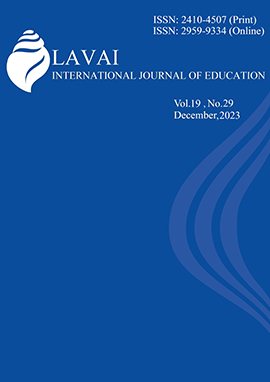Students’ evaluation of e-courses during curfew
DOI:
https://doi.org/10.5564/lavai.v19i29.3210Keywords:
E-learners, Application-based tasks, Mobile usageAbstract
Evaluating students’ experiences with e-courses during a curfew is essential for enhancing the quality and accessibility of e-learning. To assess the impact of the rapid transition to online learning and gather student feedback, the SURE method of form-based assessment was employed. According to the survey, 56.5% of all students found it suitable to study sports journalism skills online. Additionally, 53.6% expressed that direct interaction with teachers via the “Microsoft Teams” program for sports journalism electives and professional e-course lectures was more effective, while 46.4% considered independent study through seminars and practical courses (available at econtent.msue.edu.mn) to be more effective. Among the online courses offered, “Practical Sports Journalism II” and “Commentator’s Skills I” received the highest ratings. These courses emphasize electronic use, with students creating videos using mobile phones for news, reports, and comments. These videos are then uploaded to a closed Facebook group and discussed during seminars and practical sessions.
Хөл хорионы үеийн цахим хичээлүүдийн талаарх оюутнуудын үнэлгээ
Хураангуй
Цахим хичээлийн чанар, үр дүнг нэмэгдүүлэх, суралцагчдад илүү хүртээмжтэй болгоход хөл хорионы үед цахимаар хичээллэсэн оюутнуудын үнэлгээ үнэ цэнтэй. Сургалт цахим хэлбэрт богино хугацаанд шилжсэн нь сургалтад яаж нөлөөлөв, цахим хичээлийг дамжуулах хэлбэрүүдээс аль нь илүү тохиромжтой байв, суралцагчид тухайн сургалтыг хэрхэн үнэлж байгааг мэдэх зорилгоор бүтцэд суурилсан үнэлгээний SURE аргачлалаар үр дүнг үнэлсэн. Ингэхдээ оюутнуудаар цахим лекц, семинар, практик хичээлийн төрөл тус бүрээр хичээлийн үр дүнг үнэлүүлсэн. Судалгаанд оролцогч оюутны 56.5% нь ур чадварын хичээлүүдийг цахим хэлбэрээр судлах нь зохимжтой гэж үнэлсэн. Сэтгүүлч мэргэжлийн сонгон судлах болон мэргэжлийн цахим хичээлүүдийн лекцийг “Microsoft Teams” программаар багштай шууд холбогдон судлах нь үр дүн өндөр гэж 53.6%, семинар, практик хэлбэрийн мэргэжлийн хичээлүүдийг сургуулийнхаа сургалтын вэб (econtent.msue.edu.mn)-ээр бие даан судлах нь илүү үр дүнтэй гэж 46.4% нь үнэлсэн. “Спортын практик сэтгүүл зүй II”, “Тайлбарлагчийн ур чадвар I” хичээл нь цахим хэлбэрээр орсон бусад хичээлээс хамгийн өндөр үнэлгээ авсан. Тухайн хичээлүүдийн семинар, бие даан гүйцэтгэх ажлыг цахим хэрэглээн дээр нь суурилж, бичсэн мэдээ, сурвалжилга, бэлтгэсэн тайлбараа гар утсаа ашиглан видео болгож, өөрсдөө дуу оруулж хөтлөх, тайлбарлах түүнийгээ ФБ-ийн хаалттай группэд байршуулж, семинар, практикийн цаг дээр хэлэлцүүлэг хэлбэрээр явуулсныг оюутнууд сайн гэж үнэлжээ.
Түлхүүр үг: Цахим суралцагчид, И-хичээлийн хэлбэр, Цахим ур чадвар
Downloads
400
References
Vision-2050” On approving Mongolia’s long-term development policy 2020. (PM). Ulaanbaatar.
Uranchimeg, T. (2020). Structure-Oriented Evaluation an Evaluation Approach for Complex Processes and Systems. Gewerbestrasse 11, 6330 Cham, Switzerland, Springer. https://doi.org/10.1007/978-3-030-44806-6
Mongolian National University of Education. (2021). Guidelines for monitoring and evaluating the implementation of e-learning for the fall semester of the 2020-2021 academic year. Order No. A/16 dated January 13, 2021 of the Director of MNUE. Ulaanbaatar.
Mongolian National University of Education. School of Physical Education. (2021). Report of Curriculum’s department. 2021. 04.15. Ulaanbaatar.
Uranchimeg, T., Hardt, W. (2012). A measure theoretical evaluation model for learning programs. In Proceedings of the IADIS on e-Society. March 10-13. Berlin.
Гармаа, Д., Мөнхцэцэг, Н., Уянга, С. (2012). Цахим сургалтын системүүдийн үнэлгээний асуудал. Информатикийн хүрээлэнгийн бүтээл. 12, 230-251, Ulaanbaatar. http://physpub.ac.mn/uploads/papers/1559879404b12-18.pdf
Eva, Åström. (2008). E-learning quality Aspects and criteria for evaluation of e-learning in higher education. 11R. Swedish National Agency for Higher Education. Swedish.
Hemsley-Brown, Jane. (2006). Universities in a competitive global marketplace: Asystematic review of the literature on higher education marketing. International Journal of Public Sector Management 19 (4): doi: https://doi.org/10.1108/09513550610669176
Uranchimeg, T., Erdenechimeg, E., Bazarragchaa, Sodnom. (2021). E-Learning Evaluation based on SURE Model: Case of Mongolian University of Pharmaceutical Sciences, in International Journal on Communications in Computer and Information Science, in Proceedings 4th International Conference, Creativity in Intelligent Technologies and Data Science (CIT&DS2021) September. Vol.1448. doi: https://doi.org/10.1007/978-3-030-87034-8
Ministry of Education. Culture and Science. National Institute of Educational Research. (2022). Changing Education-Together for the Future” national discussion. Education 2030. Ub, 2022. Compiled by: U.Tuya H. Enkhjargal. Reviewed by: M. Itgel. Ulaanbaatar: "Sodpress" LLC.
Downloads
Published
How to Cite
Issue
Section
License
Copyright (c) 2023 Gantsetseg Sukhbaatar, Uranchimeg Tudevdagva, Selenge Erdenechimeg, Bazarragchaa Sodnom

This work is licensed under a Creative Commons Attribution 4.0 International License.
Copyright on any research article in the Lavai - International Journal of Educatioin is retained by the author(s).
The authors grant the Lavai - International Journal of Educatioin a license to publish the article and identify itself as the original publisher.

Articles in the Lavai - International Journal of Educatioin are Open Access articles published under a Creative Commons Attribution 4.0 International License CC BY.
This license permits use, distribution and reproduction in any medium, provided the original work is properly cited.




